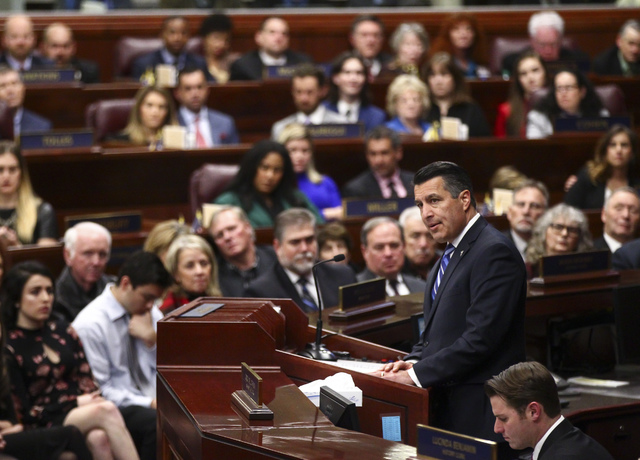Nevada’s medical community on board with governor’s health-care priorities
Nevada’s medical community is largely in agreement with Gov. Brian Sandoval’s budgetary priorities to improve health care in the state over the next two years.
Now comes the hard part: Finding funds to adequately address those issues during the legislative session, which starts Monday, without creating new gaps in the state’s strained health care system.
Sandoval and medical organizations have reached a general consensus on three main issues: the state’s continuing opioid abuse problem, funding for the UNLV School of Medicine and an increase in Medicaid reimbursement to physicians.
But while lawmakers from both parties and members of the state’s medical community generally support the priorities, some are concerned that funding for other areas — such as mental health — will be given short shrift.
Here’s how Sandoval’s proposed $8.1 billion budget for fiscal 2018-19, presented to the Legislature last month, proposes addressing the three top issues:
OPIOID ABUSE
Sandoval said he’ll introduce the Controlled Substance Abuse Prevention Act this year to provide “more training and reporting and heightened protocols for medical professionals” for prescribing pain-relieving but addictive opioids. This comes on top of legislation he signed in 2015 increasing access to the overdose antidote naloxone and providing limited immunity to witnesses who call 911 to report overdoses.
The proposal is aimed at reining in doctors who liberally prescribe opioids without depriving patients of necessary pain relief, with the goal of reducing heroin and opioid overdose deaths by 5 percent per year.
Though drug overdose deaths trended downward in the state between 2011 and 2015, opioid addiction and prescribing remain top health concerns in Nevada and across the nation.
“Our goal as a physician community is to make sure that proper regulations … are done without being overly punitive,” said Dr. Keith Brill, who serves on the government affairs committee of the Clark County Medical Society.
The state health department says Sandoval’s bill is expected to be a “budget neutral” preventative activity.
MEDICAL EDUCATION
The proposed budget includes an additional $10 million in graduate medical education funding to increase medical residency and fellowship programs in the Silver State — a win for the nascent UNLV School of Medicine and other schools providing medical training and education.
Statistics show that when physicians complete both medical school and graduate medical education in Nevada, they become more likely to practice in state.
Sandoval also included $53 million to sustain the School of Medicine in the budget, and the school says the funding will be essential to its operations as it looks to launch its inaugural class in July.
“I’m hopeful that the Legislature now will agree with him and give us the money we need to keep making progress,” medical school Dean Barbara Atkinson said.
MEDICAID REIMBURSEMENTS
Sandoval’s proposed budget for the next biennium includes $8.6 million in increased reimbursement for specific groups of health care providers, including those in assisted living facilities, adult day cares and pediatric surgical services. When matched with federal dollars, that will amount to a spending increase of nearly $34 million, according to the governor’s office.
While the bureaucratic adjustment won’t generate headlines, physician advocates argue it’s important to increase the rates to enable the state to keep those new Nevada-educated doctors in state.
“Why would someone who is just starting to practice stay here?” Goodman asked last week at a town hall event on the Las Vegas Medical District. “We’ve got to address this.”
The increases remain an issue for all providers, but especially those who weren’t singled out for increases in the budget proposal.
“We do have a lot of providers that haven’t seen rate increases in multiple years,” said Tiffany Lewis, chief of rate development with the state health department’s Division of Health Care Financing and Policy.
POINTS OF CONTENTION
Probably the biggest point of contention in the budget blueprint is Sandoval’s proposal to slash the state’s mental health spending.
The plan, which the governor’s office says is possible because of declining utilization of the system due to the expansion of Medicaid under the Affordable Care Act, is expected to meet with resistance from Democrats. Senate Majority Leader Aaron Ford, D-Las Vegas, has already expressed concerns.
The move would cut $10 million and 38 staff from Southern Nevada Adult Mental Health Services, as well as $6 million and 56 positions from Northern Nevada Adult Mental Health Services, while bolstering rural mental health services by $1.5 million.
Other health-related proposals also may stir debate.
Sen. Julia Ratti, D-Sparks, for example, has requested a bill draft that would embed some of the ACA’s reproductive health measures into state law.
The measure, which is expected to require insurance policies to cover birth control methods and male reproductive health procedures like vasectomies, was requested with an eye toward threats by Congress to repeal the ACA and block Planned Parenthood from receiving federal funding and reimbursements.
Contact Pashtana Usufzy at pusufzy@reviewjournal.com or 702-380-4563. Follow @pashtana_u on Twitter.




























